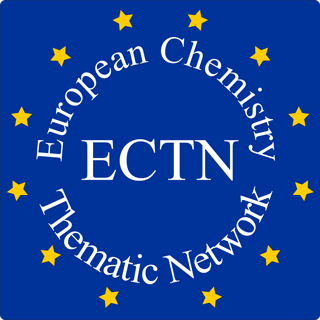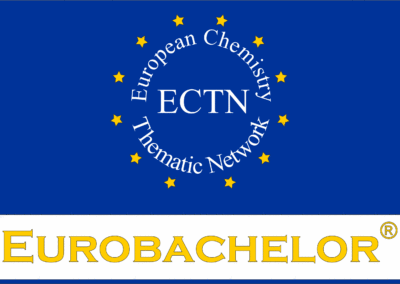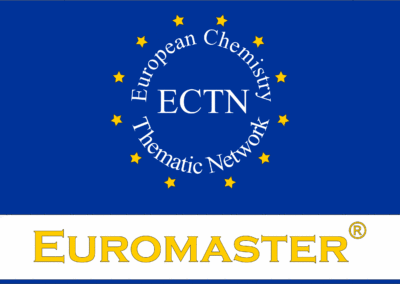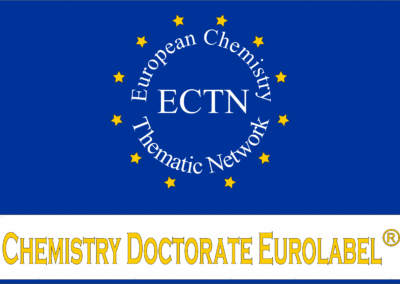Welcome to the relaunched Newsletter of the European Chemistry Thematic Network Association!
Welcome to the ECTN newsletter, which after a briefish absence returns hot off the press to inform, highlight and promote all the activities of the European Chemistry Thematic Network. I would like to thank all those that have contributed to the first edition of the relaunched ECTN Newsletter.
Be you organic or inorganic, theoretical or experimental, pure or applied, Rolling Stones or Beatles, I hope you will find your niche in our network.
Merry Chemistry and a Happy New Yield to you all!
Sanjiv Prashar, President-Elect of the ECTN
Enjoy the December 2020 issue!
Browse through the tabs below to explore the diverse and engaging contributions.
Don’t forget to fill in the STEM-CPD@EUni project questionnaires:
Lecturers: https://uva.fra1.qualtrics.com/jfe/form/SV_3R8VociX1W0Xws5
Managers: https://uva.fra1.qualtrics.com/jfe/form/SV_1z5evgQQBL7rGuh
Welcome
Dear Member Colleagues,
Welcome to the new version of the ECTN Newsletter and I trust that you are all well.
A year ago, the administrative council met in Rome to plan the Network’s events and activities for 2020. Unfortunately, “the best-laid plans of mice and men often go awry” and ECTN had to abandon the annual General Assembly which was supposed to happen in Perugia in April and go online in October. The business was done, but the feeling was not the same. Hopefully, we will pass through this pandemic situation and we can have the General Assembly as we had always done in Perugia in April 2021.
We did have some good news this year. ECTN has received funds for the project STEM-CPD@EUni. This was thanks to Natasa Brouwer-Zupancic and Iwona Maciejowska, and the work of their working group as well as Sanjiv Prashar who helped at various stages of the application. Hopefully, the funding for meetings will give ECTN member universities an incentive for participating in events for the near future. ECTN is now also participating in a consortium for an application spearheaded by The Jagellonian University of Kraków. The application will have a pandemic theme and its name is Strategic Chemists Response Against Pandemic (SCRAP). Fingers crossed on this one!
I hope that we will be able to meet in Perugia, but above all, I would like to wish you and your loved ones a peaceful and healthy festive season.
Emmanuel Sinagra, President of the ECTN
A brief history of the ECTN
The European Chemistry Thematic Network began life in 1996 when the first Socrates-Erasmus project was funded by the EU. There were 72 partners in this first project with at least one member from all the eligible countries, as this was a requirement in the early years.
The method of working was to create a number of working groups, each dealing with a specific project – a system that was continued throughout all the network projects. The first set of working groups concerned Safety, Core Chemistry, Communication and Management Skills (1996 – 1997), Core Chemistry, Chemistry and the Environment, Catalysis and New Materials, and Post-University Training for Industrial Chemists (1997 – 1998), and Practical Skills, Teaching and Learning, and Image of Chemistry (1998 – 1999).
At this time a new application for funding had to be made each year. In subsequent years the projects received 3 year funding. The following ECTN projects were ECTN2 (1999 – 2002), ECTN3 (2002 – 2006), ECTN4 (2006 – 2009).
In order to create a new project and receive further funding, a link with Chemical Engineering was made for the 2009 project application and the ECTN project became the European Chemistry and Chemical Engineering Education Network (EC2E2N). This strategy was successful and we received further funding for the EC2E2N 1 (2009 – 2012) and EC2E2N 2 (2012 – 2015) projects.
The thematic network action in the Erasmus+ action was discontinued in 2015.
Chemistry was the only Thematic Network that received continuous funding from the EU from 1996 – 2015.
In parallel with the ECTN project, a second project entitled Evaluation of Core Chemistry was funded (1996 – 1998) which lead to the creation of the EChemTest using the work carried out by the Core Chemistry working group of the first ECTN project.
Various other projects were also funded during the lifetime of the ECTN. These include funding to allow science and engineering thematic networks to work together on topics of mutual interest, funding under the Leonardo programme to work on English for Science and Engineering students (English for Special Purposes: Chemistry), and funding for Summer Schools. A notable project in which the ECTN was a partner was the Tuning project which was so successful in moving teaching and learning to an outcome based process. Again the work we did under the Tuning project drew inspiration from the Core Chemistry working group. It led to the Eurobachelor®, Euromaster® and Chemistry Doctorate® Eurolabels.
Numerous other projects were created and carried out due to the networking that took place during the years of the ECTN projects.
In 2002, we created a non-profit association, the ECTN Association, as a means of ensuring the future of ECTN when funding from the Erasmus programme was no longer available. Since 2015 this has enabled us to continue to work and meet together using our own funding.
In 2021 we will celebrate 25 years of ECTN and 20 years of the ECTN Association in 2022 – a testament to the work and enthusiasm of all ECTN members. We can be proud of our achievements. Long may this continue.
Thanks to all those who have contributed to ECTN project and Association activities and thanks to the European Commission for setting up the Erasmus programme and funding the first 20 years of our activities.
Anthony Smith, General Secretary of the ECTN
Lecturing Qualifications and Innovative Teaching Methods
Online course: Teaching in University Science Laboratories (Developing Best Practice)
The Work Group Lecturing Qualifications and Innovative Teaching Methods has developed a MOOC (Massive Open Online Course) for professional development of university lecturers and teaching assistants. It is available on the Coursera MOOCs platform.
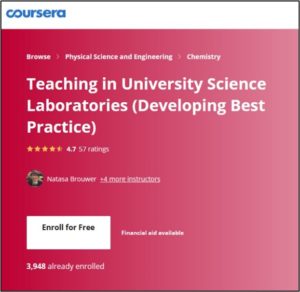
You can start it anytime you wish for free. The course has 6 modules that each takes about 2 hours to complete. Up to now, more than 380 lecturers who teach in laboratory courses from all over the world have completed this course and obtained the certificate.
You can find more information about the course and read the summary HERE.
You can enroll in the course directly on Coursera HERE.
Special Interest Group STEM-CPD
At the ECTN General Assembly in October, the ECTN WG Lecturing Qualifications and Innovative Teaching Methods has launched a Special Interest Group (SIG) for continuous professional development (CPD) of higher education lecturers in STEM (Science, Technology, Engineering and Mathematics). This SIG is closely connected to the new project STEM-CPD@EUni. You can join the SIG STEM-CPD as an associative member or as a follower. As associative member you will get the opportunity to participate in some activities of this project, while as a follower you will be informed about the progress and results of the project.
You can find more information and the link to apply for the SIG membership HERE.
Nataša Brouwer Zupančič, Chair of the WG
Chemistry in Everyday Life
As announced during the General Assembly in October 2020, the working group “Chemistry in Everyday Life” initiated the process of translation of the previously developed Q&A EChemTest database (471 questions) focusing on aspects of chemistry in our everyday life. The call has been answered by 32 scientists from Poland, Spain, Italy, France, Austria, Russia, The Netherlands, Slovenia and Finland, all willing to act as translators or reviewers. In November 2020, a dedicated internet platform has been developed for the translation process.
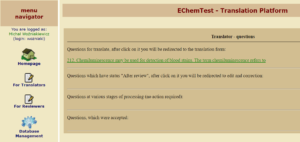
Currently, a significant number of questions have reached the “Accepted” status after being translated into Polish, Italian, Spanish, German, Finnish, Slovenian, and French, and after being reviewed. This promising evolution should allow for the translated database to be ready for use in, for example, national science festivals, European Researchers’ Night (ERN) or during faculty open days in 2021.
Nevertheless, we are constantly looking for new participants who would like to offer their free time to help in the translation process. Particularly, we are missing translators and reviewers in French, Russian, Finnish and German. If you would like to join the Team, please contact me by email (michal.wozniakiewicz · [at] · uj · edu · pl).
Michał Woźniakiewicz, Chair of the WG
Chemistry Student Mobility and Database
Learning mobility activities, like many other sectors, have been negatively affected by the COVID-19 outbreak, causing an uncertain future and a falling demand in student mobility applications.
To limit the risk of infection, participating countries introduced social distancing measures; the interruption of face-to-face lessons and the closure of educational institutions had an immense impact on internationalisation and mobility. More than 107 000 participants in Erasmus+ mobility were negatively impacted by the situation caused by the COVID-pandemic.

It is worth highlighting the efforts of many chemistry institutions and educators who have adapted their courses for distance learning and have been able, through the use of new tools, to communicate, respond, and examine their students remotely. The level of students’ satisfaction regarding virtual activities was generally positive.
Different surveys were run to better understand the way European Universities jointly addressed common challenges caused by the health crisis. In a recent survey carried out by Erasmus+ and European Solidarity Corps, only 25% of students’ mobility were unaffected by the COVID-19 situation. Of the remaining 75%, only 42% of students continued their activities often using distance learning arrangements and carrying out virtual activities, while the remainder opted to temporarily suspend or entirely cancel the mobility period.
We should point out that one of the biggest advantages of studying abroad for many international students is the chance to become immersed in a totally different environment, learn a new study system and language – all of which was very limited by the pandemic. Spending time abroad often results in a higher level of maturity and personal independence. Students often learn a lot about themselves and what they are capable of by living in a foreign environment.
Therefore, regarding the next academic year, the impact on internationalisation and mobility remains a big issue until the COVID-19 pandemic is over. Unfortunately, early surveys suggest there is a long way to go.
The ECTN Chemistry Student Mobility Work Group aims to increase the quality and relevance of mobility periods of students and young researchers providing information and promotion for exchanges in all three cycles in Chemistry and Chemical Engineering. To make up for the lack of common activities, the web page of the WG was regularly updated, reporting new job opportunities and training for students and PhD.
When a student wants to study abroad and find a suitable program, the ECTN Chemistry Student Mobility Database is a complete online tool to find a programme in Chemistry and Chemical Engineering throughout Europe. Through the database, users can compare different opportunities and make the best choice for them. Students can find several types of programs to choose from, and decide which one might be the best for them.
The Chemistry Student Mobility Database is now in the process of updating information from different institutions, and improving the search system in order to make it easier for Students to find relevant information on the website.
Gabriella Borzone, Chair of the WG
Activities for Students
EChemTest competitions
During the last few years, the main activity of this Work Group was the European ECTN EChemTest Competition, addressed to students at the secondary education level (before entering university). The competition has been organised annually since 2011/12 by the EChemTest Testing Centres, consisting of two stages: Local/National stage (General Chemistry 1 and General Chemistry 2 tests in local languages) and European Finale (General Chemistry 1 and General Chemistry 2 in English). The first edition was organised by the Test Centres in Poland and Greece; in the following years, the group of participating countries was extended to include Slovenia, Czech Republic, and Hungary. During the years over 2000 students have participated in this series of events.
In 2019, the new EChemTest competition was implemented, for university students. The idea of the European EchemTest Tournament was tested in 2019, in the form of the game between two teams: Loránd Eötvös University in Budapest, and Jagiellonian University in Kraków.
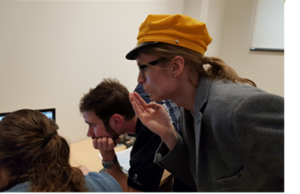
Unfortunately, due to COVID-19 pandemic, both activities could not be finalised. It is likely that we will face the same difficulties in 2021. However, fast development by the Perugia group of new features of the LibreEOL software used for EChemTest test sessions, may help us to carry out the competitions remotely. Therefore, we would like to ask the ECTN member institutions to consider joining the group of organising/participating in both competitions (email contact: michalak · [at] · chemia · uj · edu · pl).
Artur Michalak, Chair of the WG
Label Committee
The ECTN offers institutions the possibility of applying for a Chemistry Quality Eurolabels.
In 2020, the Label Committee worked with the following composition: Chair is Pavel Drašar (University of Chemistry and Technology Prague, Czech Republic), Vice-Chair is Martino Di Serio (University of Naples Federico II, Italy), Secretary for Internal Matters is Janusz Ryczkowski (Marie Curie-Sklodowska University Lublin, Poland), Secretary for External Matters is Gergely Tóth (Eötvös Loránd University Budapest, Hungary)
Since the Krakow meeting on 13 April 2019, the ECTN Label Committee has made recommendations to award Eurolabels to:
Jagiellonian University of Kraków
TU Gdańsk
FHS Idstein
University of Debrecen
University of Navarra
University of Aveiro
And is currently evaluating applications from:
University of Zurich
University of Wroclaw
University of Ljubljana
University of Warsaw
Additionally, the LC organized expert coaching on 19 September 2019 in St. Petersburg, for Russian accreditation agency AKKORK experts. On 17-18 September 2019, there were three LC experts (RS, GT, PD) present carrying out the onsite accreditation of chemistry programs of St. Petersburg University that was organised by AKKORK.
Pavel Drašar, Chair of the LC
Virtual Education Community Committee
EChemTest® goes online and opens to schools
EChemTest® is now online. Relevant Self Evaluation Sessions (SES) can be run in remote under the control of the Examiner of any Test Centre (or Accredited Test Site) of the ECTN member Universities, thanks to the recent evolution of the LibreEOL platform managed by Professor Osvaldo Gervasi and his collaborators at the Department of Mathematics and Computer Science of the University of Perugia.
As a result of the centralisation of the related administrative procedures starting from January 2021, it will be possible to plan in advance the SESs, run them (either in presence or remotely), report their outcomes and award, as well, Individual Proficiency certificates. The remote-run option will also allow people from other Universities, Schools and private companies to register through the EChemTest® Test Centre they wish and take a SES.
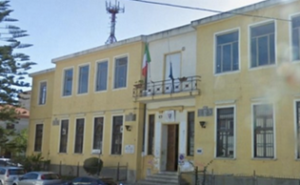
The Donegani Technical Institute of Crotone (Italy)
Thanks to a concerted initiative of the VEC and the Educational Division of the Italian Chemical Society, the Technical Institute of Crotone (Italy) has already appointed a Local ECTN Adviser (LEA) among its teachers to help its students to get ready to take the proper EChemTest® SESs and use the related certificates to apply for admission to ECTN member Universities worldwide. This is also a first step towards establishing EChemTest® Accredited Test Sites at schools.
Antonio Laganà, Chair of the VEC Committee
Quality Standards in Teaching Committee
Well before the scheduled meeting in Perugia, Leo Gros (Chair of the QST) looked into various possibilities to set up useful projects for ECTN which might develop into grant applications – so to speak a product development in ECTN. This was in part based on discussions he had held with Reiner Salzer and Gergely Tóth in Kraków on 12 April 2019. The results were presented to the GA at the end of the Kraków meeting and approved. Due to Leo’s severe accident in January 2020, and during the “corona year” 2020 (the Perugia meeting having been cancelled), there was little concrete progress in this matter.
There were, however, phone calls with several colleagues including Terry Mitchell and the German MNU – (Deutscher Verein zur Förderung des Mathematischen und Naturwissenschaftlichen Unterrichts – German Association for Advancing Mathematical-Scientific Teaching – colleagues Bernd Ralle and Jürgen Langlet, co-ordinator in the Institute for Quality – Development IKB in Berlin), who had co-operated in developing a common reference framework for the sciences (GeRRN). MNU co-operates with partner organisations in Benelux countries, UK, France, Denmark and Italy. With people from this (European) environment, the QST and ECTN would have partners who genuinely come from the secondary school didactic side and have a European perspective. MNU might help to bridge the gap between general curricular work in GeRRN and teacher training by formulating expectations/demands the framework would have with respect to teacher training.
During the online ECTN General Assembly on 3 October 2020, Leo presented an update. As the leader of the QST, he welcomed the great success of Iwona and Nataša and a team of European partners who were successful with a European project grant called STEM-CPD@EUni. This project aims at sustainable quality of teaching and learning in higher education STEM (Science, Technology, Engineering and Mathematics) courses.
The SC-QST, in contrast, looks into the needs of secondary school teachers who, according to a number of European sources, need e.g. training and CPD in ICT (information and communications technology); the Corona situation aggravates the consequences of a lack of competences in this field.
A second possible field of SC-QST activities is the Europe-wide framework GeRRN mentioned above, for science and chemistry teaching in schools (curricular, aiming at learning outcomes), taking into account the newest didactic as well as content and societal aspects, currently being developed in a European context.
In the coming months, the SC will additionally contact the DivChemEd of EuChemS.
Leo himself, as a retired person, does no longer have available the infrastructure of his university. So he sees himself as coordinator who can bring people and possible tasks together. To this effect, and to keep the ECTN community informed, this small report has been written for the Newsletter in December 2020. Any helpful suggestions will be warmly welcomed.
I do hope to meet you again in 2021.
Leo Gros, Chair of the QST
STEM-CPD@EUni project
There is a widespread belief in science faculties that teaching competences are a kind of innate gift or talent or are acquired automatically along with teaching experience. I am sure that teaching skills may and should be developed like any other professional competence. The ECTN Work Group Lecturing Qualifications and Innovative Teaching Methods, under leadership of Nataša Brouwer, has initiated a new European project on continuous professional development of lecturers who teach in STEM disciplines (Science, Technology, Engineering and Mathematics). Project called STEM-CPD@EUni, which received funding from the programme ERASMUS+ Strategic partnership, is planned for the period 2020-2023. Professional development in the project will be based on the TPACK model – a synergy of technological, pedagogical, and content knowledge of the lecturer.
Lecturers from ECTN member institutions can get involved in the project in two ways: either as contractors (ECTN is responsible for dissemination and sustainability of the project intellectual outcomes, the large number of ECTN members also enables a reliable needs analysis and the determination of the STEM-CPD roadmap) or as beneficiaries. In the latter case, we offer the opportunity to become a CPD Ambassador. At the summer school, the CPD-Ambassadors will gain knowledge, receive relevant material and also produce their own material to organize CPD activities at their home universities, including microMOOCs.
Read more: VIRT&L-COMM (unipg.it)
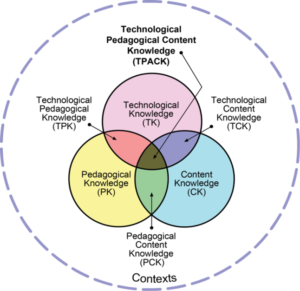
The TPACK model, taken from http://tpack.org © 2012 by tpack.org (Mishra & Koehler, 2006)
Iwona Maciejowska
Inquiry to establish guidelines for continuous professional development of university lecturers in STEM
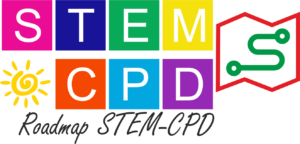
The STEM-CPD@EUni project, started in September 2020, aims to improve continuous professional development (CPD) of higher education lecturers in STEM (STEM= Science, Technology, Engineering and Mathematics) at European universities. As a first step, we have developed a questionnaire to gain insights into the needs and expectations of university teaching and managerial staff. Based on the results of this inquiry, we will prioritise specific output competences for the lecturers in university STEM and establish criteria for the selection of topics of the professional development activities that are relevant to be developed and to be implemented at different universities in Europe. We will provide guidelines for the universities on how to organise continuous professional development (CPD) activities at a local level.
The questionnaire is designed for two different target groups:
- Lecturers: everyone who is teaching in STEM disciplines at the Bachelor or Master level at university. Teaching activities include interaction with students in lectures, problem-solving and other types of active learning sessions, and support of students during experimental or research assignments.
Questionnaire link: https://uva.fra1.qualtrics.com/jfe/form/SV_3R8VociX1W0Xws5 - Managers: everyone who is involved in the decision making process about programme curricula and the quality of teaching staff in STEM disciplines.
Questionnaire link: https://uva.fra1.qualtrics.com/jfe/form/SV_1z5evgQQBL7rGuh
It takes about 20 minutes to complete each questionnaire. Often people have both roles. In that case, you may choose the role you wish, or complete both questionnaires to view the CPD from two different perspectives.
The data of this survey will be processed in a strictly anonymous way and will only be used for the STEM-CPD@EUni project and to inform on its outcomes in different reports and professional journals.
Could you please complete the questionnaire before Friday, 15 January 2020. Many thanks for your cooperation!
For more information, have a look at the STEM-CPD@EUni roadmap.
Nataša Brouwer Zupančič

The European Commission’s support for the production of this publication does not constitute an endorsement of the contents, which reflect the views only of the authors, and the Commission cannot be held responsible for any use which may be made of the information contained therein.

